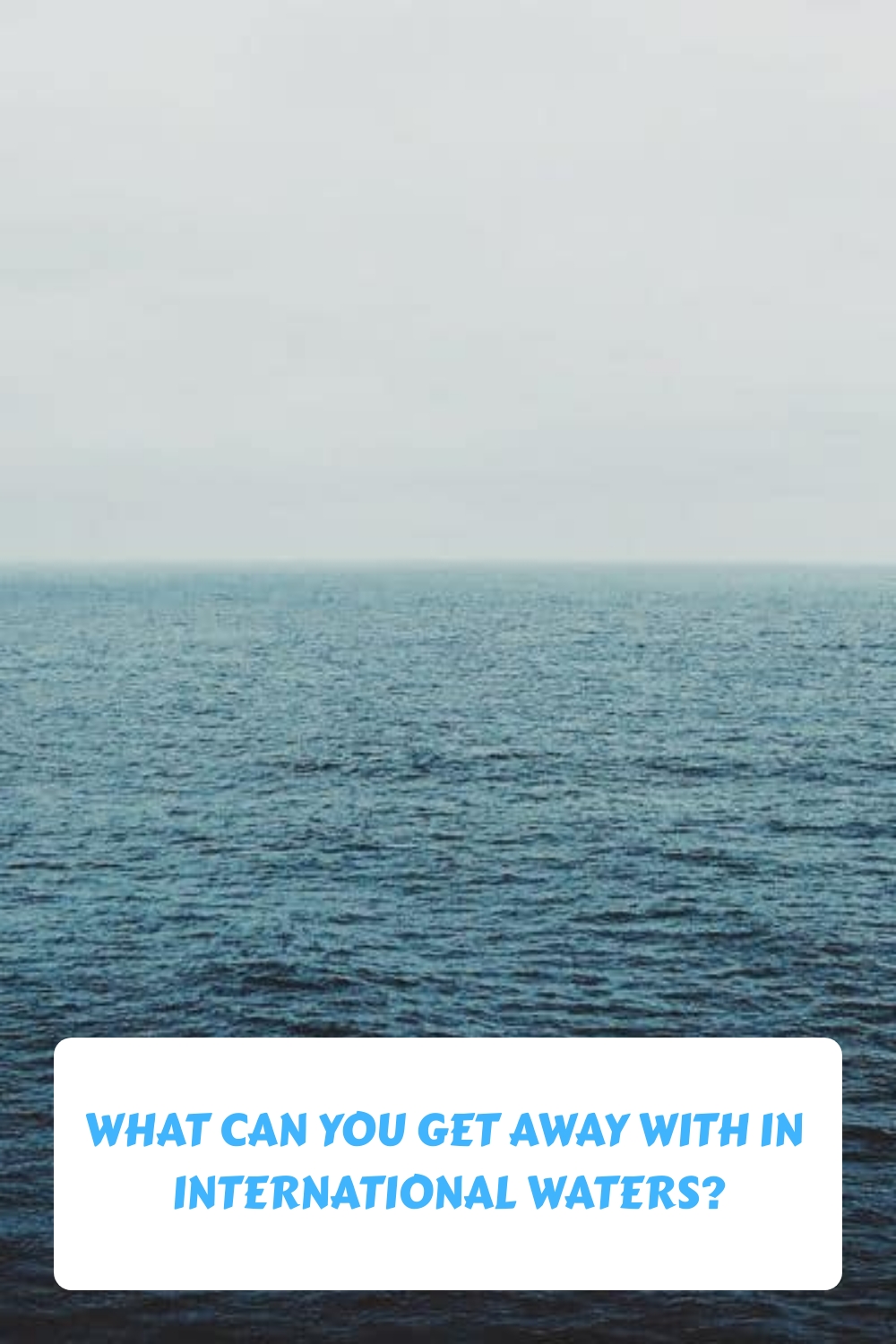You might’ve heard the term international waters and wondered what that means when it comes to the law. After all, if you’re not in any country, does that mean you can get away with things you wouldn’t be able to on land?
Not necessarily. In this guide, I’ll explain what international waters are, and why you can’t just do whatever you want when you’re in them.
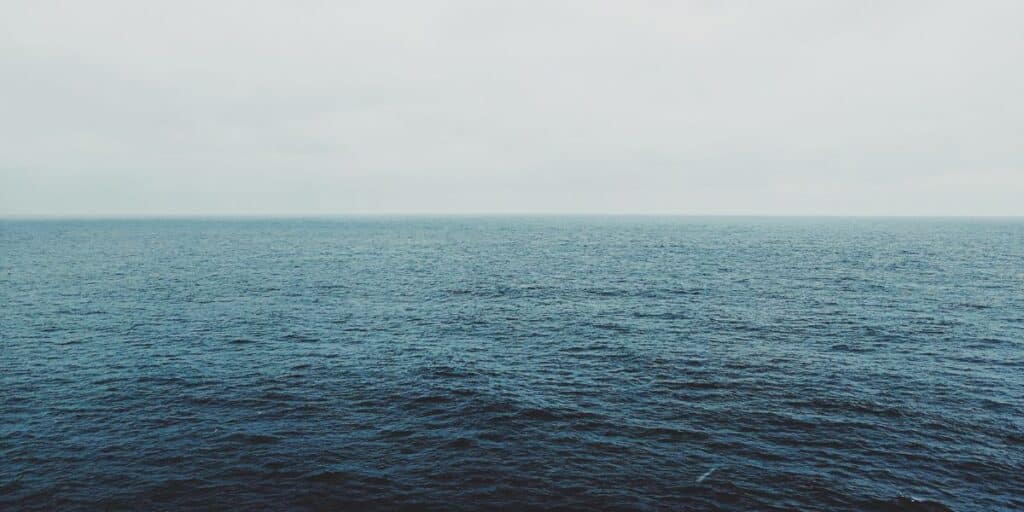
International waters classified
International waters are classified as those further out than 12 nautical miles from the nearest ‘baseline’ – the average coast of a country at low tide. Countries can also claim control over a further 12 nautical miles in the ‘contiguous zone’ to protect immigration, sanitary or customs laws.
There are quite a few different rules surrounding international laws but broadly, anything that is 12 nautical miles (around 14 miles as measured on land / 22 kilometres) would be considered to be in international waters.
International waters are shown in dark blue on this map…
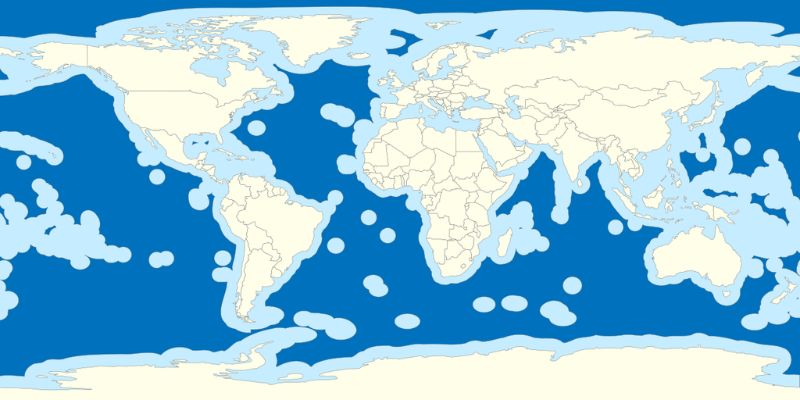
But the light blue extends more than 12 miles from the coast on that map, doesn’t it? Yes, well done if you spotted that.
You see there’s another important zone worth knowing about, which is the Exclusive Economic Zone. This extends 200 nautical miles from the coast, and gives countries control over the economic resources within that space, such as for fishing, oil drilling and mining.
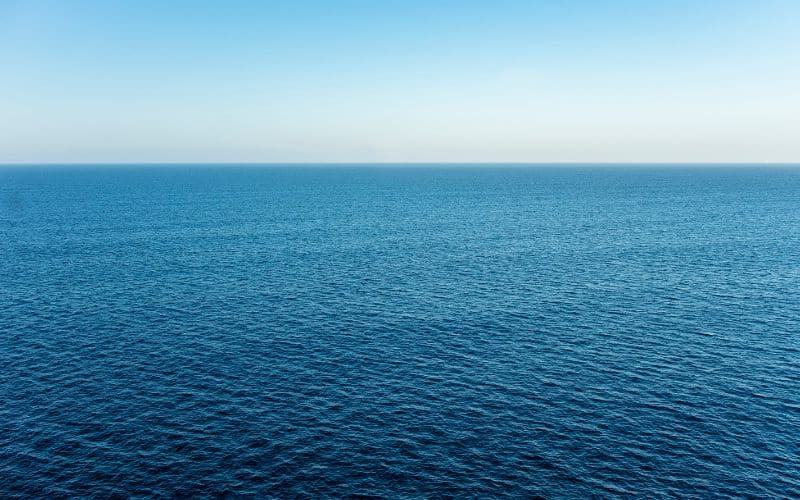
Why is international waters 12 miles?
There is no defined reason for why the international waters limit is 12 nautical miles. It is a barrier that has simply been agreed between countries when setting the standards under the 1983 Law of the Seas Convention.
Europe was the first continent to try to establish a limit on territorial waters in the early 1800s and that was set to three nautical miles, the average distance a cannon could fire – so in theory, the distance a country could defend.
Some countries around the world exceeded this but it was only those that claimed over 12 nautical miles that typically received a backlash. And so eventually 12 nautical miles was accepted. The reason it’s 12 instead of 10 or 15 is because a league is 3 nautical miles, so setting the border as a multiple of 3 made sense. The territorial border for waters is at four leagues.
Don’t assume that international waters are a free-for-all
Not everything is legal in international waters. While international waters aren’t covered by one country’s set of laws, you are governed by the laws of the country your ship is registered in.

If your ship doesn’t fly any flag, you’re governed by universal jurisdiction, where any other ship can intervene in your crimes to stop you.
Plus, any victims of crimes can claim the laws of their own country. So even if you don’t fly a flag and you claim to not be from a country yourself, if your crime involves a victim, you can be subject to the laws of the victim’s country.
Suggested read: How Are Crimes Dealt With At Sea?
Put simply – no, you can’t do whatever the heck you want when you’re in international waters.
1. Drinking alcohol
Drinking alcohol is legal in international waters, and the minimum drinking age is established based on the country where the ship is flagged. You’re allowed to drink if you’re 18 years old if you’re travelling on a ship registered in a country where that is the minimum drinking age.
When it comes to cruises, most cruise lines will still keep the limit at 21 years of age. Rather than follow the laws of the country where they are based, they will follow the law of the ports they visit and depart from. So if you’re cruising from the US, you’ll usually need to be 21 or older to drink, even when you’re in international waters.
Read more: Can you drink on a cruise at 18?
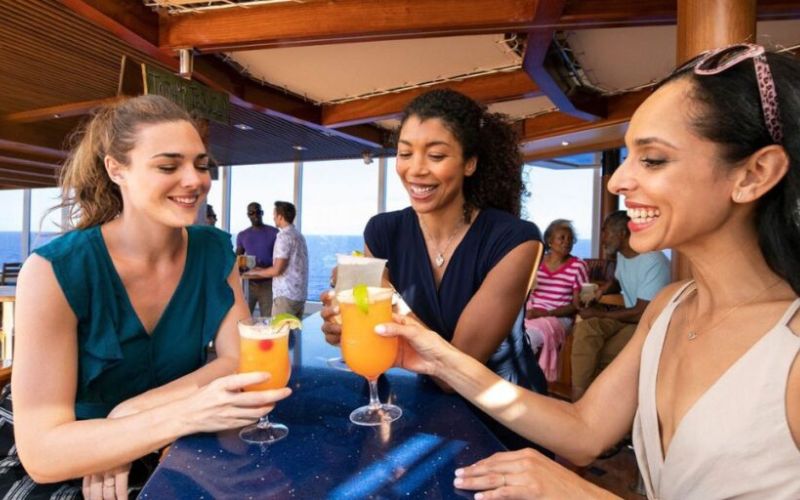
2. Gambling
Gambling is legal in international waters for anyone who is an adult aged 18 or older. Many countries have strict laws on gambling, but these laws don’t apply in international waters. Some companies offer off-shore gambling ships purely for those who want to gamble away from their home country’s laws.
When it comes to cruising, gambling will usually be restricted when you’re in territorial waters of a country that has stricter gambling laws, such as the US. But as soon as you’re 12 nautical miles out to sea, the casinos will open and gambling is allowed.
Even if you’re cruising in a country where gambling is legal, like in the UK, then the casino usually won’t open until the ship is at sea for tax reasons.

3. Doing drugs
It’s generally illegal to do most drugs in international waters – it depends on the law of the country where your ship is registered. If your country has different drug laws at state/regional level then the accepted federal law will apply.
So if you’re on a cruise, don’t expect to be able to take along some weed, or even medical marijuana. It’s banned completely, and cruise lines take a hard stance against people bringing drugs onto the ships.
Even if it’s legal in your home state, and you need it for pain management, you’ll need to find an alternative to use during your cruise. It’s a hard no.
Read more: Bringing weed on a cruise

4. Murder
Unsurprisingly, murder is not legal in international waters. Even if you were on a ship that was not registered to a country where murder is outlawed, the laws of the country where you or the victim are from would deem murder to be illegal.

Of course, this also applies to murder on cruise ships. Just because your cruise ship heads away from territorial waters doesn’t mean that the passengers can start killing. Cruise ships are generally very safe places, although there have been very rare cases of people killing others by throwing them off the ship. They are, of course, tried for murder.
Read more: How many people go missing on cruise ships?
5. Getting married
You can legally get married while you’re in international waters, and it will be a recognised marriage back on land. However, you’ll need to get a wedding license from the country where your ship is registered, and it’s important to note that some countries still don’t allow same-sex weddings.
For that reason, some cruise lines also only offer weddings for a man and a woman, but there are some cruise lines such as Celebrity Cruises which will perform same-sex weddings.
If you’re getting married on a cruise, the cruise line will help you with all the details of acquiring your license so that your marriage is considered binding.
Sometimes, the captain will perform the wedding, an other times it may be a celebrant who works on board the ship.

6. Piracy
Piracy is defined as any illegal act of violence, detention or act of depredation directed against a ship, so of course that means it is illegal in international waters. Pirates may not fly a flag from a country on their ship, but under international maritime law, they are still acting illegally because they have victims, whose laws will apply.

Piracy is not really an issue for cruise ships. The ships are too large for pirates to target. And even if they tried to, cruise ships can be boarded by special security teams to defend the ship. They also have sonic boom weapons that can knock pirates off a ship, and high-pressure hoses to prevent pirates from boarding.
7. Carrying a gun
In international waters, you are permitted to carry any firearm that would normally be permitted under the laws of the country that the ship is flagged under. However, the carrying policy also depends on the owners of the boat – they are allowed to set their own rules on whether firearms are allowed on ships.
On a cruise ship, you’re not allowed to take a gun with you, even if your home state allows you to carry one. You have to abide by the rules of the cruise line.
Read more: Guns on cruise ships
As a side note, while this doesn’t really apply to cruising, it is legal to shoot a pirate in most cases. It will almost always be classified as self-defence and that is legal in most international laws.

8. Fishing
The laws on fishing in international waters are a little complicated, but fish within 200 nautical miles of a coastline belong to that country, as part of the Exclusive Economic Zone. Fish outside these boundaries are governed by the Regional Fisheries Management Organizations.
If you wanted to fish within an EEZ you would need to have a fishing license from the country that owned the fish in those waters. To fish in waters governed by the RFMOs, you would need to determine which organisation managed the waters and apply for a license with them.
A man was once caught fishing off the balcony of a Carnival cruise ship. You can read all about that here.

9. Mining
Every country is allowed to mine and drill for oil within 200 nautical miles of its coastline – this is the Exclusive Economic Zone and any resources in this area belong to the country. Outside of the EEZ companies don’t mine or drill for oil. If they did, they could be challenged on sovereignty by another nation.
Where countries lie closer than 200 nautical miles apart, a median line is drawn. Basically, whichever country the resources are closest too, that country takes ownership.

10. Viking funerals
The laws on whether Viking funerals are allowed in international waters are unclear. Viking funerals are generally banned around the world by most countries, and in theory, the laws of the ship used to escort the cadaver would apply.
Viking funerals – where the dead body is sent off in a boat surrounded by their possessions, and often set alight, are usually illegal. Some places – including select parts of the UK – permit elements of a burial at sea, but they must involve a concrete casket.
In terms of cruises, don’t expect to be able to have a Viking funeral on a cruise ship. They’re already strict enough on the scattering of ashes.
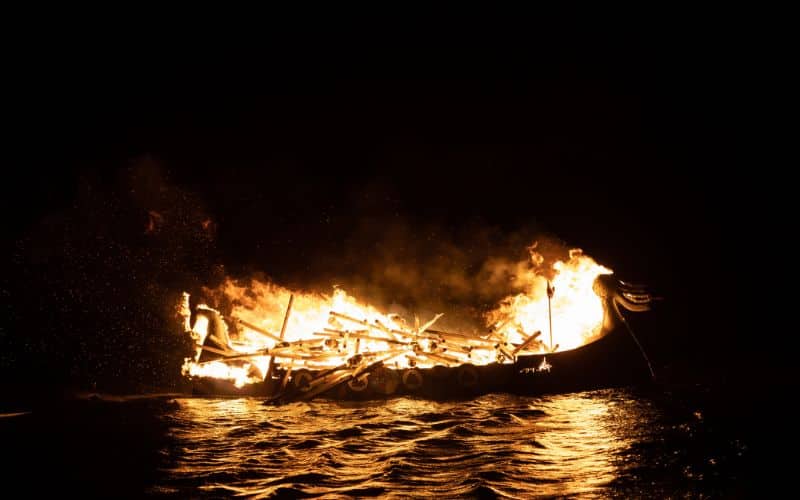
11. Paying taxes
The laws for paying taxes, if you are in international waters, vary depending on your home country and the time you spend at sea. If you’re from the UK but you spend more than half your year in international waters, you normally won’t have to pay taxes on any money you earn.

There are some cruise ships that are designed for people to live on. You could, in theory, work remotely on these ships and not have to pay any taxes if you’re spending enough time on the high seas. But the laws do vary by country so you’d need to check with your tax office.
Read more: Living on a cruise ship
Doing something illegal in international waters – the consequences
If you do something illegal in international waters, you’ll be arrested and tried under the laws of the ship that you’re sailing on. If you are on your own boat, then any other ship can intervene under universal law and arrest you as per their own legal systems.
If you commit a crime while you’re at sea and you’re caught, you will still get in trouble. Any ship is allowed to act to prevent illegal activity.
And if you do something illegal on a cruise ship, you can expect to be sent to the ship’s jail (yes, they have one) where you will stay until either the next port of call or the end of your cruise. You’ll then be met by police officers at the shore, who will arrest you under their own law.
Of course, this depends on the severity of the crime. If you’ve somehow snuck weed onto a ship and you’re caught smoking it, you might not get arrested – you may instead just have it confiscated, or you might be kicked off the ship when next in port, but without the police getting involved. It varies.
Read more: Do Cruise Ships Have Police?
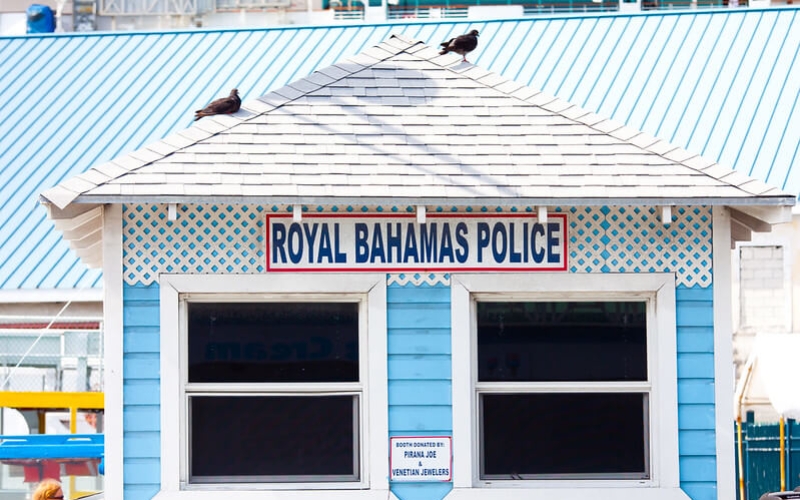
Final word
If the idea of international waters sounded intriguing and potentially exciting, I’ve probably taken the spark out of it a little now. It’s not an exciting location where anything goes, you do still need to follow the law.
But some laws are more varied. Americans who want to gamble can do so more freely on a cruise ship, and some ships have a drinking age of 18 on the high seas compared to some drinking ages of 21 on land.
Don’t try to break the law when you’re next on a cruise though. It’s not worth it!
TODAY’S BEST CRUISE DEALS!
Don’t miss these offers…
Related topics
- What Happens If You Jump Off A Cruise Ship?
- Cruise Myths Debunked
- 8 Things That Are Illegal On Cruise Ships (But OK on Land)

Jenni Fielding is the founder of Cruise Mummy. She has worked in the cruise industry since 2015 and has taken over 30 cruises. Now, she helps over 1 million people per month to plan their perfect cruise holidays.

